I must say that I have a massive soft spot for the VW Transporter. In fact, it’s only the astronomical asking prices Transporters go for that have prevented me from buying one. It’s one of the few vehicles that have a timeless design and benefit from a cult-like following and wealth of aftermarket parts and services.
Unfortunately, like many vehicles from the VW range, the Transporter BiTDi has been plagued with a serious issue that could result in total engine failure. Initially, this issue appears as high oil usage, whilst this can be common in some of the VAG engines (namely my 2015 Skoda Octavia TDi VRS) this is much more serious than you’d expect.
What causes the issue?
High oil usage in the VW CFCA 2.0 180hp engine is the unfortunate result of the EGR cooler corroding internally. As pictured above, the aluminum cooling fins corrode in the process of cooling the exhaust gases being returned to the engine. You can find more about EGR valves and how they work in our EGR valve FAQ article
The aluminum debris resulting from this corrosion passes into the engine cylinders and gets stuck in the piston rings resulting in excess bore wear. Over time this causes the piston rings to fail, resulting in low compression, high oil usage, and rapid internal damage caused by the aluminum debris in the oil.
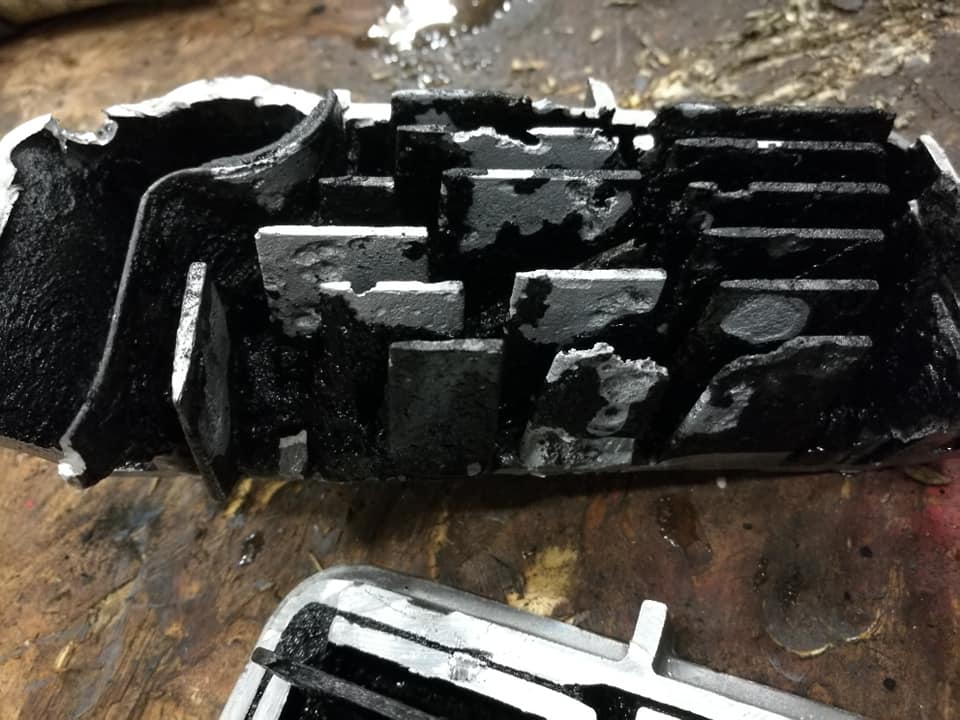
Which model of EGR cooler is at fault?
The EGR cooler responsible for the issue is a suffix C or earlier unit. The suffix D type coolers are not as prone to corrosion but many owners still exercise caution with this model.
You can tell which EGR cooler you have by checking for the model code as below
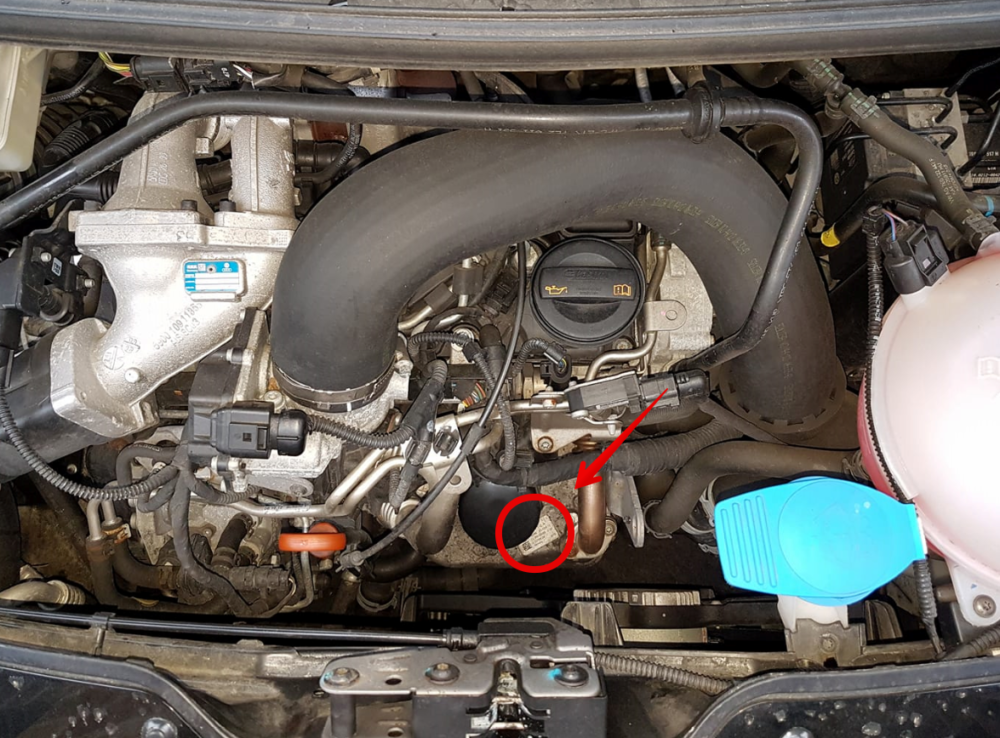
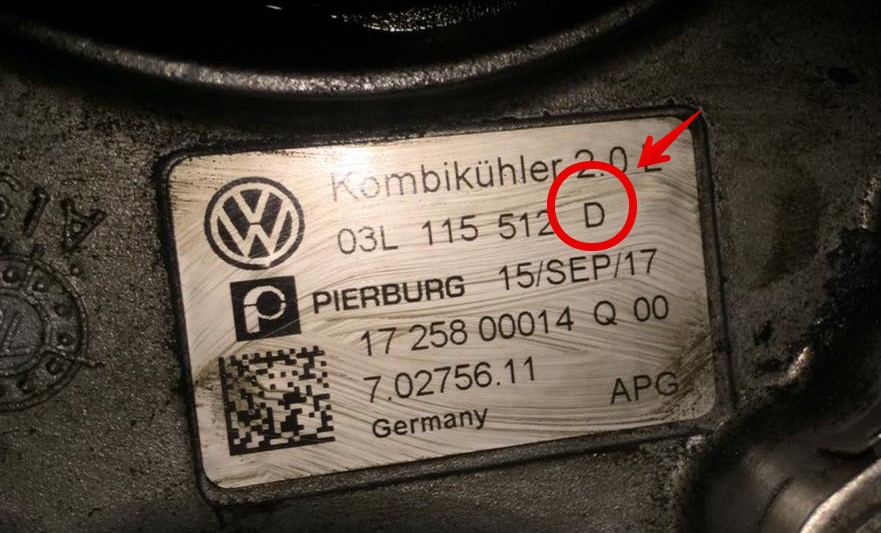
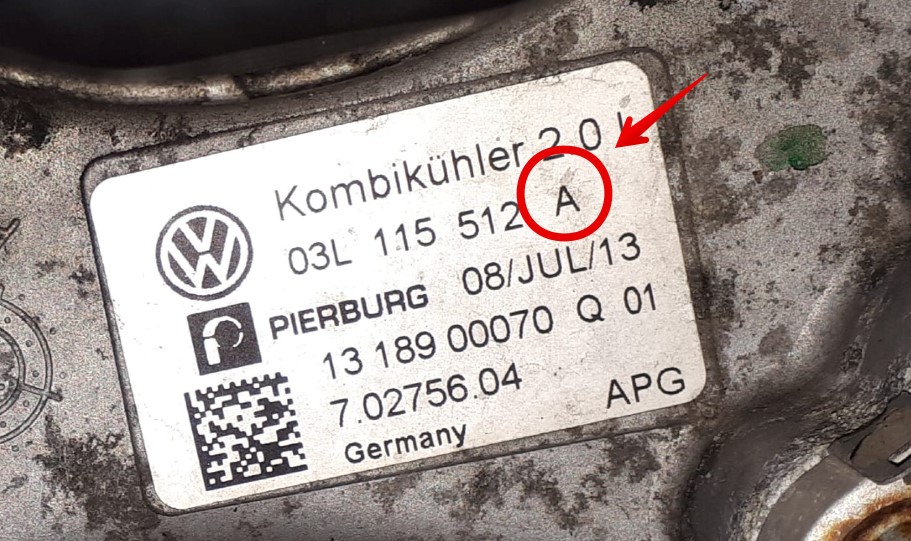
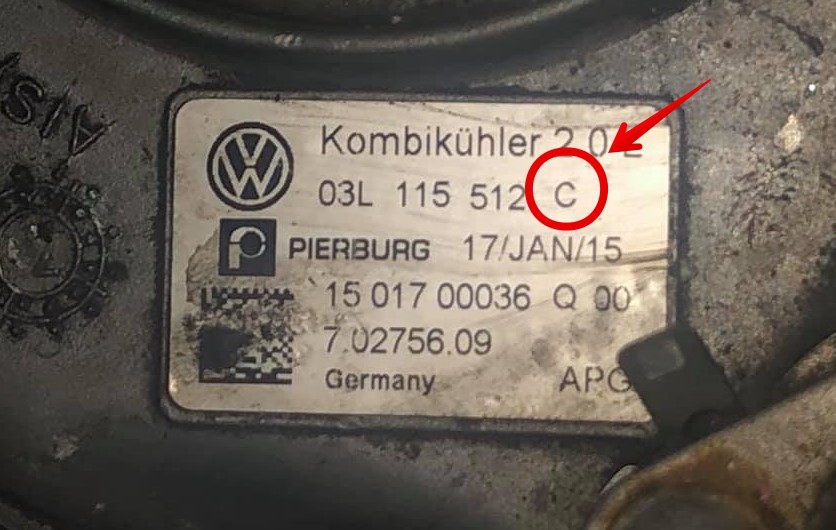
How to diagnose?
There are a number of ways to diagnose if your engine has been affected by this issue.
- High Oil usage
Whist some VAG diesel engines are known for their oil usage, it’s not uncommon that a BiTDi engine affected by this issue could use up to 1 litre of oil per 400Kms. For a healthy engine, it’s expected that the engine uses in the range of x liters per 1000 miles / 1600 km. - Excessive DPF regeneration
Excess oil usage/burning will cause the DPF to work much harder to remove the added oil from exhaust gases. This will cause the DPF regeneration process to trigger much more frequently and reduce the life of the filter. You can learn more about DPFs in our Diesel Particulate Filter FAQ article - Compression test
This will reveal if the piston rings have been damaged – resulting in low compression. For this engine, it’s expected to be around 23 – 31 bar. The wear limit of the engine is 19 bar with an acceptable range of 5 bar difference between all cylinders. It’s also been suggested that in lieu of a compression test you can remove the oil cap and see if you can detect and air blowing out – this would indicate worn piston rings. This isn’t something I’ve tried but would be interested to learn more – please do let us know in the comments. - Oil analysis
An oil analysis will how if there are metal particles and debit contained in the oil. This analysis is often opted for by owners who are attempting to claim for the damage under warranty and require proof that the engine failing / failed. - EML (engine management light)
Whist high oil usage causes a number of telltale symptoms, these aren’t necessarily going to cause the EML to illuminate. Please get in touch if you have any experiences with the EML and this issue.
Will VW cover this under warranty?
Unfortunately not. VW will not honor any warranty on this issue. Your only hope is that the issue can be proven and diagnosed during any dealer warranty period. This is a minimum of 3 months when buying from a dealer.
Does VW acknowledge this issue?
In an official capacity, VW has all but washed their hands of this issue. Internally its another matter. We’ve been made aware by an anonymous source that an internal memo floating around VW fully acknowledges the issue and its causes. As you can see below from the internal document we have obtained, VW fully understands the issue surrounding the fault.
Disclaimer: Please be aware that this document was provided to us by an owner experiencing this issue – we can not verify that it is in fact genuine.
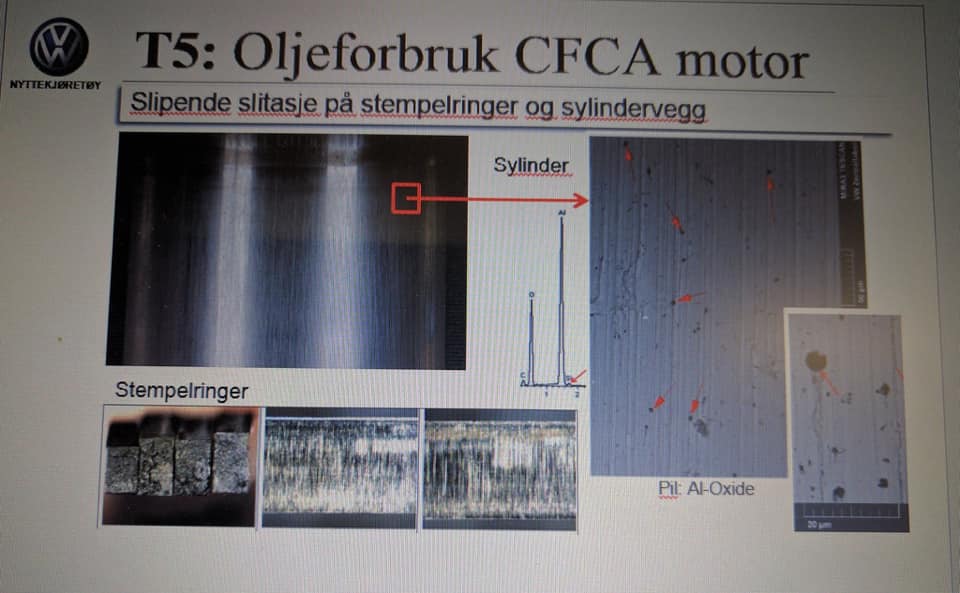
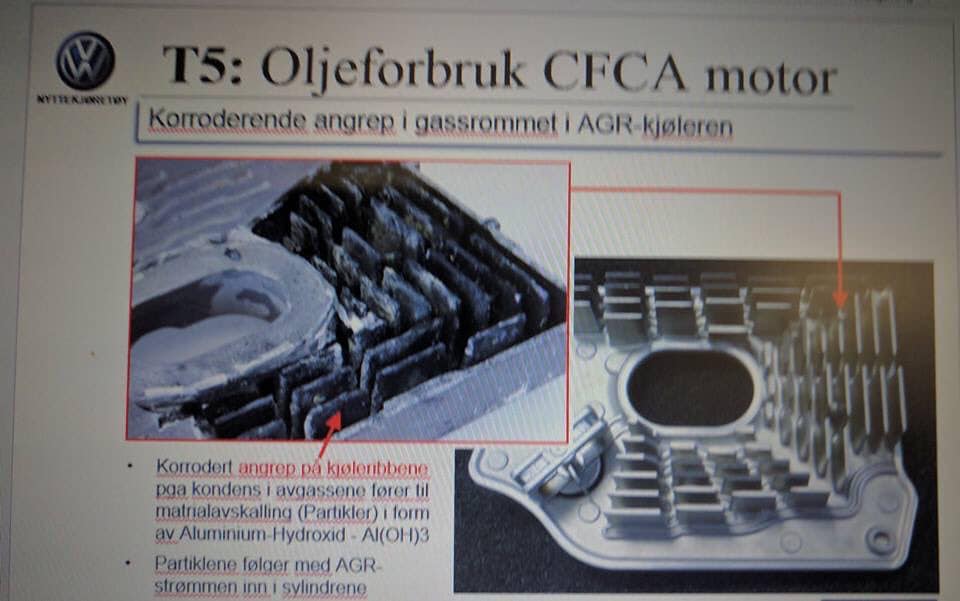
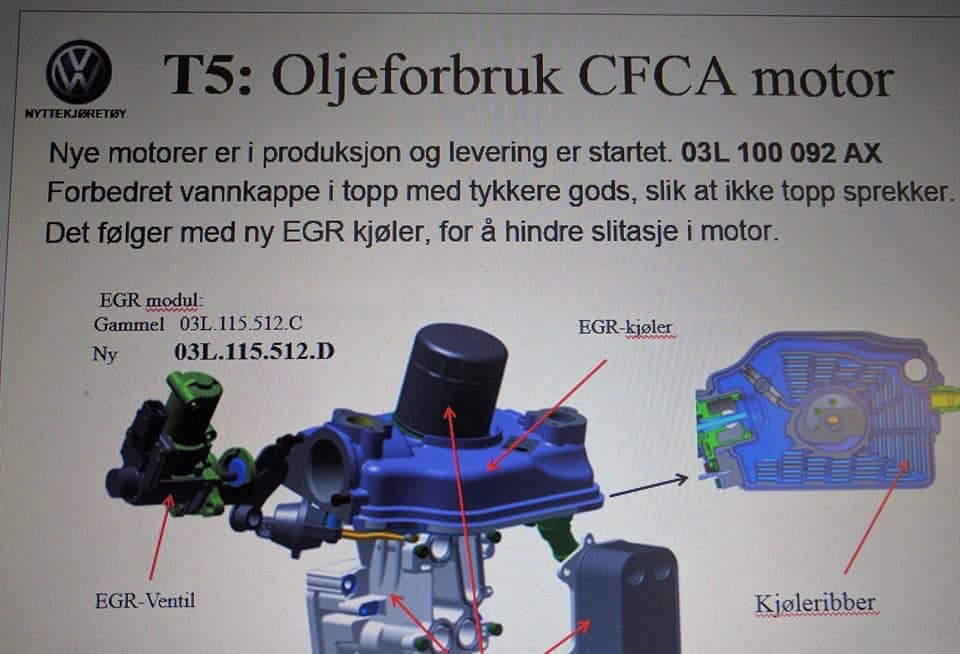
[ad]
What precautions can be taken
If you’re not experiencing high oil usage or unusually frequent DPF regeneration it might not be too late to take action. Many owners have opted to either replace the EGR with a type D unit or remove the EGR completely. This would involve having it removed from the engine and a blanking plate fitted. The engine will require the EGR device “mapping” out of the ECU.
Another option is to fit a Tafmet EGR emulator or cheat device. This small magic box emulates/simulates a working EGR valve preventing the engine from delecting it has been removed or blanked off. You can learn more about the Tafmet EGR emulator here
We’re also aware that owners also take the opportunity to have the DPF removed and some power added during the remapping process.
Please be aware that any modifications to the emission control systems of a vehicle are illegal for on-road use. These modifications could result in an MOT failure and your insurance being invalid in the event that the modifications are spotted after a claim. Do this at your own risk.
How much is a new engine
This is a tough question, but expect a new engine to be upwards of £8,000 depending on milage and labor. If you’re competent with the spanners then this cost could be much less. If you’ve had a new engine then please get in touch so we can update this with real-world examples.

My Transporter has all the symptoms of this issue, what can I do?
You have two options – a new engine or sell up. Whilst we’d not recommend you hide the issue and sell it on to another unsuspecting owner if I had a van exhibiting all the symptoms I’d be looking at trading it in.
In its advanced stage, it’s too late to opt for an EGR delete or swap. The damage is already done.
What to look for if you’re buying a VW Transporter BiTDi 180
On the face of it, there is no way of telling if a van has been affected by this issue. Unless you are buying from an owner that has taken the precautions of swapping out the EGR valve for a D type unit before any damage or can prove that it’s had a new engine, I’d proceed with extreme caution. You could put a condition of sale on a healthy compression test result or oil analysis however there is still a risk that the engine could be toast.
We need your help
We’ve been aware of this issue for some time now and we’d love to hear your feedback on this issue. If I’m talking sh*t or have missed something you feel should be included in this article then please let me know in the comments or email karl (at) Hypermiler.co.uk
We continually revisit our articles to ensure they are as useful and accurate as possible.
Join the discussion
Fortunately (or maybe, unfortunately) if you’re reading this article you’re not alone. A total of 1700 members (at the publication of this article) are a member of the VW T5.1 / T6 excessive oil use for CFCA 2.0 180hp engines Facebook group. Be sure to check it out – there is a wealth of information and very knowledgeable owners who may be able to help. Be sure to tell them who sent you.

Let’s hear from you!
Have you been affected by high oil usage in your VW transporter? Let us know in the comments below

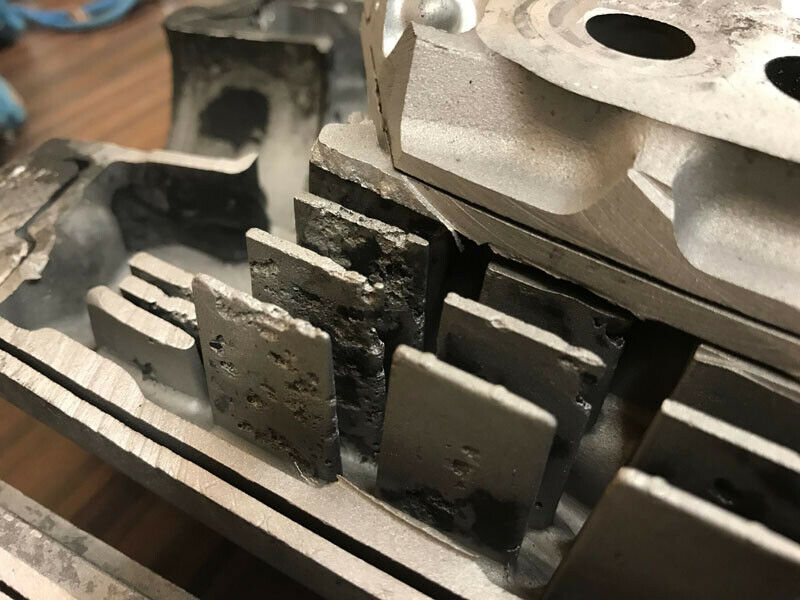



Hi Karl, this is an informative article but please replace the x with a value for oil usage (in High Oil Usage) and the same with the missing PSI value (Compression Test).
Having had my California’s EGR Cooler replaced by a ‘D’ version, the EGR blanked-off and a re map completed by RetroResus in Bridgwater, I’m sure their knowledge-base is better than most. The engine is now pulling better lower down and the fuel consumption has improved slightly. My insurance premiums have only increased slightly after informing them of the modifications.
Hi John thanks for all the great information, one question how come you had the EGR replaced with it being blanked off I thought that wouldn’t be needed?
Hello, Thomas from sweden here. I had my engine replaced without any cost by Volkswagen. After 184000km the oil use was approx 1L/400km. I found an article that Volkswagen replaced all the engines in the Swedish police force VW Multivan with the affected engine as goodwill. After I claimed the identical reasons, they changed the engine in my Multivan and gave me 2 years warranty on the new engine. I have the invoice the local dealer sent to Volkswagen Sweden. The total cost was approx 17.000€
Hi Thomas could you be able to tell us how you made the complaint and the link to the article as well. this would be very helpful
Hello Miklos vagyok. Sajnos en is szembesultem a fent emlitett hibakkal, csak nekem az elado (kereskedo) nem jelezte a motor problemait. Csaladdal nagyon orultunk a vasarlaskor es tenyleg boldogok voltunk emeszep es nekunk uj autonak. 2010 vw T5. 2 180Le. Sajnos az elso 2 het utan turbo csere volt. Amit meg egyszer kovetett kb ra 3 hetre. Ezek mind garancialisan megoldva lettek majd meg en csereltem 4 szer a turbo turbinakat mire meglett a tenyleges problema okozoja. Egy hosszabb uton a felesegem vezetett, uton a nyaralasba. Majd az autonak elment a nyomasa, semmi nyomatel es gyenge lett. Letapadtak es leegtek a olajluhuzó gyuruk. A motor szetszedesekor szembesultem azzal hogy az egr D tipusura csereltek, a hengerfej is uj, viszont a motor brutalisan kopott. Erosen a veszes hataron volt. Megrendeltem az uj dugo szettet esosszeraktam, eleg sokat tudtunk vele menni, majd eddig ismeretlen okokbol megalt, motor ujra szet es kiderult hogy a gyuruk osszeforogtak. Maig tisztazatlan, mind harom gyuru 120fokban eltolva volt. Osszerakas utan ujra szalad a kocsi. De a Dpf szurot kiiktattam es szoftveresen lekapcsoltam mert irto ciki es budos amikor regeneralt. Majd 1- 2 evug semmi baja nem volt. Egyszer csak elment az olajnyomas. Ezt egy bizonyos 6 szögletű kis tengej okozta 2 szer is. Ami kesobb kinyirta a főtengely es a hajtokar siklócsapagyait. Azen alkatreszek csereivel es specialis olaj segitsegelev megoldodott minden nemu baja. Bat a kiegyensujozot (balance tengelyt) szeretnem kidobni belole mert annak a kopasa miatt csorog es zorog. Nem hangosan de engem zavar. Ezt meglehet oldani ugy hogy a motor olajpumpat at kell alakuttani lancosra, kell egy kis odafigyeles es technikai jartassag. De megoldhato.
Az auto ara 25.000frank volt es az eddig raforditott osszeg javitas es transport
10.000frank
My experiences back this up and go further.
My engine failed at 4 years old and 48k miles. I had a better than full service history with both VW and very well respected independent garages.
My engine suffered from deposits on no 2 cylinder bearing leading to a catastrophic engine failure. Bent rods, scored liner etc. All other shells were perfect and in line with the mileage and state of the vehilce.
My engine failed on dual carriageway without warning, no previous noises, issues, I took cruise control off and….. Bang.
I was just out of VW warranty but had an extended warranty having purchased outside of the main dealer network. I thought I was covered.
My extended warranty has blamed anything they possibly could to avoid payment, to such an extent that I am issuing court proceedings. They have dragged things on for a year and I have had to finally fix the van myself.
I approached my local VW dealer for assistance and received none. I was pushed aside as out of warranty and when I asked for a tech to visit and inspect the now removed engine to rebut the warranty companies allegation that it was a wear and tear failure, they wanted the engine back in the van.
The back and forth was like a well rehearsed dance!
After 12 months without the use of the van I finally had to cave and fix it myself.
Crank re-grind, oversized bearings, new rods, new piston, all new ancillaries were the start.
My head was a wreck, the wear for such a low mileage engine was outrageous. All exhaust valves and seats were toast. The inlets on the same path, it needed a full rebuild.
Turbos showed signs of play, so rebuilt.
The oil cooler was full of metal flake and replaced.
To add some balance, I have a VW T4 with 260k miles and it has never let me down. I run it across the UK and Europe and would trust it to continue for another 100k at least.
I doubt my T5 will see 100k in total.
For now I will run it but I expect that eventually I will look to trade it in with VW and give them back the problem they gave me. I hope they have something from another manufacturer in stock.
After 30 years of running VAG cars this will be my last. Their comments that they pride themselves on their goodwill programmes and customer service are not something I could say I have experienced.
Advice appreciated….I recently purchased a t5 bitdi 4 motion 2014. Found her going into limp mode when hitting a motorway. Also she feels a little sluggish when pulling off, mid range ok though.Is there a fault code which can be linked to this knackered engine issue. After expressing my egr concerns to my garage the garage have just replaced the turbo which they were certain was the issue when they plugged her in. ( think it read low pressure on turbo b) but just paid the bill of £4600 ( invested in cam belt/ haldex etc tools I had confidence in them) and headed for the nearest duel carriageway……. Cruise control 70 mph, went to overtake and limp mode kicked in . Gutted. Taken it straight back to them and waiting on outcome.Any advice greatly appreciated-
I have just had the exact same issue with mine. P0299 turbo underboost problem, causing limp mode on the motorway. Turned out to be a vacuum leak inside the plastic rocker cover. Your problem will likely be a vacuum leak by the sounds of it. My problem took a long time to diagnose but was eventually identified with a smoke test on the vacuum system. I recommend you have that done if you haven’t already. Best of luck
I have T5 2015 with 180.000klm , just start to burn oil 2L in 1000klm .
I have just noticed I am affected with this any information would he appreciated thanks
I have been thinking of buying a 2010 camper with 25000 miles on , this is worrying , what if the EGR plate has no ABC OR D on ?do i assume its an early on and has not been changed.
I’ve just had the engine replaced on my T5 BiTurbo CFCA engine at 70k miles. I have the displaced EGR (C) valve and am trying to find someone qualified to carry out a forensic examination to go with my oil sample report as evidence for my claim against VW CV UK. I can’t find anyone to do this, any ideas.
BTW I know other claims have been rejected but that won’t stop me trying it’s not just the money, there’s a moral aspect to this and the manufacturers should not be allowed to get away with it!
How did you get on with this as I am around 62000 and just discovered it if only had the van since Feb
https://autofahrerseite.eu/recht/garantie/475-vw-t5-bitdi-motorschaeden.html
VW has been pulled in court in Germany and now agrees to pay 80% of the repair..!
Do you know if anyone in the uk has been successful on receiving the 80% off the repair ?
My fully serviced 2005 1.9 T5 still runs well after 234,000 miles but unfortunately needs replacing due to London’s new low emission standards. Are there any engine issues with the Euro6 deisel 150BHP T6 from 2018-2020? I have recently made inquiries with a VW main dealer for a 2018 T6 which has already had a new engine fitted after only 23,000 miles which raises a few concerns. Is the 2019 – 2020 engine a better option?
I have a 2019 204 – 4motion dog and the suspect a head failure has a coolant red light on and it still ran fine didn’t overheat. im waiting for them to sort it… really upset.
Hi I have a 2010 180 T5 120.000miles no issues
Hello
I have an EGR with no A or D suffix on like another comment here – what does that signify please?
I’ve just been told by Vw that they will go 50/50 on a new engine with me, looking for another make of van to be honest, any ideas.
Hi – you’d reckon VW would let us owners know about such a disaster waiting to happen with our vans.
We could have remedied prior to total engine failure/replacement.
In 2014, I bought a 20kkms 2011 T5 to convert to a camper for my wife. She’d borrowed a T4 and loved it, very very reliable.
In comparistion, our T5 is a pile of junk.
It’s been off the road five times in 6 years now. Any it’s only done 90kkm. This EGR time bomb is the last straw.
My brother bought a Golf 1.4 for his wife, more engine problems and huge expense to fix. I thought, I’d be safe with a VW commmercial vehicle. WRONG.
Sorry to say it, I will NEVER by a VW again – and will actively advise anyone who is considering to avoid them like the plague.
VW = no after sales, no early warning, no responsibility for anything that they fail in = no respect = VW
You’d think the German’s could do better.
There are plenty of other cars and vans out there to choose from.
Eg: have a look at the new Hyundai Staria range – one is an AWD.
my van is a fully kitted out 2012 vw t5 bitdi sportline DSG camper so to us worth a small fortune
had the dpf removed the egr deleted or blanked off oil and filter done by me twice a year and had a big service including the cam belt at 50k now at 54k and when in for a service they told ne the low pressure turbo was duff so I bought replacements but took my old ones to be tested and was told they were perfect,
this engine runs fine but smokes blue at idle and when pulling away so not sure what the story is now
I bought a T5.1 California with full service history from a dealer, we didn’t get to use it as it was just before lock down. On our first long trip we had the DPF light come on and then went into limp home mode, which meant having to take the vehicle in for a forced regen. At this time the issue pointed towards replacing the DPF.
On return I noticed the oil usage was around 1L per 500 miles. An oil sample was taken, and reading a number of CFCA owner horror stories clarified the situation.
I was not aware of the issue prior to buying the vehicle, I wish I had of done!
The approach from VW is disgraceful with regards to an issue, it is clearly a design failure mode that was not validated properly in the engine development phase.
A decent manufacturer would protect the customer!
# lovebeing10Kout of pocket
Hi
I have a 2012 vw transporter 180 dsg 4 motion. I too share some issues. Mine does not use much oil. I service it myself every 8k with castrol oil and a filter
The egr cooler worried me so i changed it to a d suffix and did cambelt kit and dsg oil and filter at 48k
Oil usage is about 500ml per 100o miles. I will cut my old egr cooler open when i get 5
After doing all the repairs and preventative measures the van got to exactly 50k . Drove down the road and did a u turn and all of a sudden the flashing glow plug light came on. Then a few miles later the eml light. Thyen a month later the dpf light
I managed as i needed to use the van. Bought an autel scanner and it said po299 underboost. I cleared the faults but it soon went back to limp mode and went slightly better in limp mode but it was oh so slow
Garages offered pointers but i checked everything twice over. I suspected turbo from day 1. I have a project on my pit so my poor vw had to manage for 2 years of careful driving. With a reset of fault codes it would go very well if you could get it past 2900rpm but as soon as you slowed down lights were all back on. The scanner managed to do a regen for the dpf but no change
So last weekend i took the plunge. What a pain of a task to get turbos off a 4 motion but i did it and ive never seen this before. The small turbo exhaust turbine had snapped off???. No marks or anything at all and shaft and bearings were perfect apart from the end snapping off. Got some new parts and im putting it back together. It will be fine once its done im sure and go well again
Not the best issue i have found but at least i stood my ground and i was right so im happy. Got some seconhand turbos which have only done 500 miles from new so i will let you know. Has anyone else had this issue???. I think it was driving home 2 years ago in slush and ice after a biggish snowfall in the day. Then parked up and it froze the condensation in exhaust housing. Drove down the road 1/2 mile and then instant no power. There is a heat plate that sits behind turbine wheel and that should be flat but it was dished so im sure it did the damage. VW did not even reply. Also the rear haldex pump has stopped working so once i turn the van around i will let you know on that too. My old vitos and sprinters did nearly 200k before any issues. VW turbo is 2800 plus vat. The vito was 286 plus vat and so easy to change. Sadly vitos rust too quick or i would be sold to them
Hi, Gaz Just rebuilt one of these engines after failure it had the new type D cooler it was corroded to death the pictures are on T6 forum along with details of engine failure caused by EGR cooler corrosion.
The small turbo was sheered off as you describe bought a genuine new turbo with no exchange for £1200 also all the injectors were damaged I was Quoted £235 for reconditioned and bought new ones for £190 Ea
You need to make sure you adjust and set waste gates after reassembling turbos.
Hello,
Maybe I will buy a Multivan and on the RGR it’s 03L 115 512 without letter, what does it mean? Good or bad?
Thank you.
Hi Just joined the gang. Well i say just joined, I have been having problems since my van was nearly new. Where has the facebook group gone? I cant find it.
Why haven’t VW issued a recall to fix this issue! I’ve just discovered my California is affected by this (2015 T5.1 with type C EGR cooler). I brought it from VW dealer just over a year ago. No issues yet but I’m concerned as many in the comments said they had engine failure without warning.
i have a 2015 T5.1 180 BiTDI with now 115K miles. Ive got all the symptoms. My EGR was swapped out last year when it was too late. Im down on compression around low to mid 20’s and i’m burning oil at about 1 liter per 1500 miles and my fuel consumption is around 33mpg. i get white smoke on startup, but no other visible symptoms. Im just waiting for that time when it lets itself go. I keep thinking about engine replacement as i want to keep the van, however ive not found anyone to supply and fit yet. suggestions are welcome.
Good morning,
I bought a used 2014 Multivan from a professional 6 months ago. The engine is supposedly new (in fact it is a reconditioned engine because there is no such thing as new). From the first day I had the “oil pressure alert, engine stopped” warning light which appeared for less than a second before disappearing. I took the vehicle back to the garage where I bought it, they changed the oil pressure sensor but the problem returned… they then changed the oil pump. Everything worked fine for a month and then it started again… This time they changed the EGR cooler and the cylinder head. Everything worked fine for about 2000 kilometers and now the problem is starting again. Last week the garage measured the oil pressure by connecting a pressure gauge. the pressure is good but just above what Volkswagen recommends. The warning light always comes on when the engine is warm after around 60 kilometers and always in the deceleration phase, never when accelerating and never at constant speed. I check the oil level every two fills of fuel and it is always perfect, the car does not consume oil. The garage took an oil sample last week, I’m waiting for the results to find out more. Has anyone here ever had problems with low oil pressure?
My 2014 75k miles transported sportline is having high oil use problems I’ve taken it to a main dealer who has said it is not below the oil usage recommended by VW. I’d done a journey of approximately 280miles after having it inspected by the dealer after the 280 miles the oil light came on. Is this excessive oil use ! Which is the best way of tackling this with VW ?
Hi, I just discover this problem by googling it and finding this page. I have a multivan 180 bitdi from march 2014, so ten years today and 240 000 km. These problems started about 2 years ago (Oil consumption about 1l / 1000km, PDF warning, sometime going into security mode – that’s to say unable to pass 70km/h). I now realise that my local dealer (in France) lied to me by acting like it was a surprised when I came for a DPF regeneration and pointing this problem. They started to say I have to change the engine, but without performing any test. I didn’t ask a quote but the guy said it must be around 17 000 EUR! As I was not aware of this known problem I really thought they were crazy and as they are in a posh area and probably sell more rs6 than golf I thought they were trying to rip me off or get rid of me… So I went to a little shop and these guys said basically that this is a common problem and they know about it so they’ll put an additive and it will be ok. I accepted because I was still not aware how serious it was. But I have to admit I’ve done 1000 km since and the oil is stable and no warning. What do you think? do you know such a thing?
I’m also thinking to buy any VW car easily resellable from VW just two have them buy back my van. Can they devaluate the price of it because of the problem even if it’s their responsibility ? If I hide it to the VW dealer can they complain afterward? I’m really annoy now because I realise that they could have tell me how serious it was and that it was a KNOWN problem…